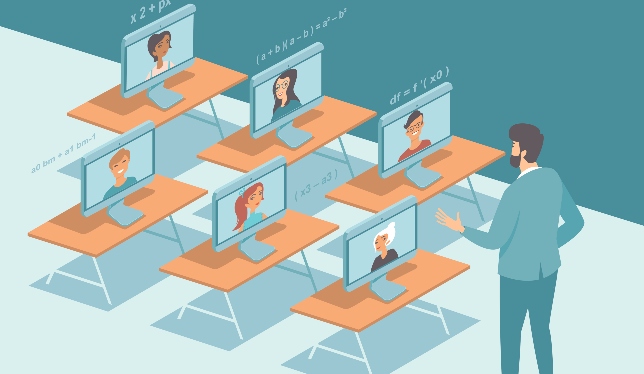A pedagogical manifesto for the upcoming academic year
Seek instructional help from colleagues, be honest with your students, be generous to yourself and others. We’re all in this together.

I’m a Liverpool FC fan, so the song You Will Never Walk Alone shows up on more than one of my playlists. But when it comes up these days, in light of all that is happening, it seems take on an even more significant meaning. We’re all a little nervy right now – students, instructors, deans, presidents – mired as we are in pandemic planning and uncertainty.
Many instructors are not only redesigning and rethinking their courses for alternate delivery, but they are also having to learn and understand a variety of online tools to facilitate that redesign. In the “before times,” this process might have taken a few months of good, positive energy, coupled with the curiosity and drive to fully embrace online learning. We no longer have these conditions, if we ever did, which is why so many of us don’t really teach this way. We had a couple of months, maybe.
Add to that the looming doom about enrolment, genuine concern about our students and what the future holds for them, and our own reactions to pandemic living. It is, for many of us, an incredibly stressful time. If you have a colleague who has made this transition seamlessly and is dropping online-learning jargon left and right, they are not the norm. But they are totally awesome, and you should be their friend because they may be able to help you. You don’t need to walk alone here.
A pedagogical lifeline
You have probably accessed your institution’s teaching and learning centre (TLC). If you haven’t, go now. Educational developers and instructional designers are a lifeline right now. They will, quite honestly, hold your hand through this process and set you and your students up for success. And it’s not just about how to use Zoom or learning management systems, it’s about taking a holistic look at your courses, especially your learning outcomes and assessment strategies, and redesigning them for the online environment. It’s about examining your pedagogical choices and asking if they need to shift, or completely change, now that you’re teaching online. Having experts who can inform both the online learning piece and the course design piece is one of the most valuable resources available to institutions and faculty right now. And yes, TLC also stands for tender loving care.
If you don’t have a teaching and learning centre at your institution (and I feel for you if this is the case), then you need to find your people. Buddy up to “jargon Betty” above, or whoever you see being able to help you. I think everyone will need at least one friend-colleague, a “frolleague,” to work together with, peer-reviewing your processes and your outputs. I know this feels vulnerable sometimes, opening up and sharing all your ideas to someone else – especially some smarty-pants university colleague who, like you, has been raised on a steady diet of critical thinking – but here’s where you set your ego aside and fully embrace the fruits of that diet.
Staying connected at this time is vital. We know this. At my teaching and learning centre, we’ve created a cohort course redesign model to build community while at the same time modelling online learning and effective course design. This cohort provides that necessary peer-connectivity that will inevitably aid in this transition.
Paulo Freire, that dreamy Marxist
Paolo Freire, the Brazilian educator and advocate of critical pedagogy, is my jam and has been since I was a bleary-eyed graduate student. I love his dreamy pedagogical Marxism and how he speaks truth to power every chance he gets, even if he’s dead. He’s all education for empowerment, and we’re in this together, and power imbalances and hierarchies are silly and counter-productive in the classroom.
I also think his pedagogical philosophy is really helpful now. If you’re nervous about online classes this fall and uncertain of how to teach in this new world order, why not be honest about that from the get-go? You do not have to be an expert in online teaching from the start. You may very well become an expert by the end of spring 2021, but remind yourself and your students you’re just starting out. Let’s all go forward together. I’d have some way of sending this message to students early on, something like:
So here’s the deal awesome new students of mine. I’ve been nervous and worried about this day for months. I don’t gravitate toward this type of teaching. Sure I can see its merits, and I’m learning here, but if it weren’t for the pandemic then I’d probably be in my classroom right now, and far more confident and at ease. But this is where we’re at and I’m sharing this journey with you, and I want us to go forward together. Here’s what I’ve decided to do in this course, here’s how I’m going to do it, and here’s why I’ve made those choices (yes, you can be transparent!). I’m going to be checking in with all of you periodically throughout the semester so that you can give me feedback on how it’s working. I want to know how it’s going, and what’s working so that I can learn even more about this way of teaching, and I can make adjustments (maybe). Ultimately, I want to give all of you the best possible experience that I can. Finally, I hope to model for all of you how I did my best to rise to this challenge because, going forward, we’re all going to have more challenges and I think we won’t get through them in a vacuum.
If you don’t collect feedback periodically throughout your course, now’s the time to start. Feedback into how students are learning, taking up the material and struggling is key to effective teaching. But it becomes even more important as you push off into a fall semester in what may be a shaky boat. This feedback process should be low-stakes and anonymous. You can use survey tools built into your LMS, or ones that are not. Reviewing the feedback will help you to make adjustments during the course and in future courses. Here’s an excellent link from York University about collecting feedback.
Finally, labour issues
When colleagues are losing their positions, and unions are getting their “layoff language” in order, it’s easy for us to default to the “well, I’m lucky to have a job” self-talk. Yes, but even amid all this madness, institutions and those who hold them up (that’s all of us) must remember that we are all still human beings. We still have rights, and those rights mustn’t be forgotten. Workload is workload.
Of course there will have to be a little give and take in these times. We have to support our institutions and our students to the best of our abilities, but institutions will also have to acknowledge and support faculty with what is turning out to be exhausting and crushing demands on wellness and sanity. The good ones will show empathy and reasonableness, creativity and recognition. The not-so-good ones will lose their cool, bend beneath the pressure and maybe even kick a couple of us while we’re down. So it may fall to us to hold ourselves and our colleagues up.
Look for the broken, for the exhausted and the worried, and if you have anything left in your tank, carry them as you can. That includes having the right to question, the right to push back a little, and the right to ensure our rights are respected while we work under immense pressure to redesign higher education. Like Paulo, we still have to speak truth to power when the need arises, even if it means getting kicked around a bit for doing it. Institutions will have to find creative, courageous and kind ways to ensure all of this effort gets recognized.
There is a significant onus on faculty right now, but there is also a significant onus on institutions and their leadership teams. When we walk through this storm, it is the good ones who will make sure that we don’t walk alone.
Kathleen Bortolin is a curriculum, teaching and learning specialist in the Centre for Innovation and Excellence in Learning at Vancouver Island University.
Featured Jobs
- Canada Excellence Research Chair in Computational Social Science, AI, and Democracy (Associate or Full Professor)McGill University
- Psychology - Assistant Professor (Speech-Language Pathology)University of Victoria
- Veterinary Medicine - Faculty Position (Large Animal Internal Medicine) University of Saskatchewan
- Education - (2) Assistant or Associate Professors, Teaching Scholars (Educational Leadership)Western University
- Business – Lecturer or Assistant Professor, 2-year term (Strategic Management) McMaster University















Post a comment
University Affairs moderates all comments according to the following guidelines. If approved, comments generally appear within one business day. We may republish particularly insightful remarks in our print edition or elsewhere.